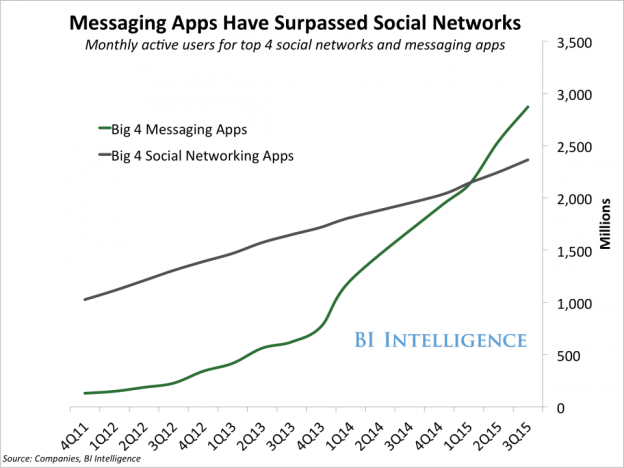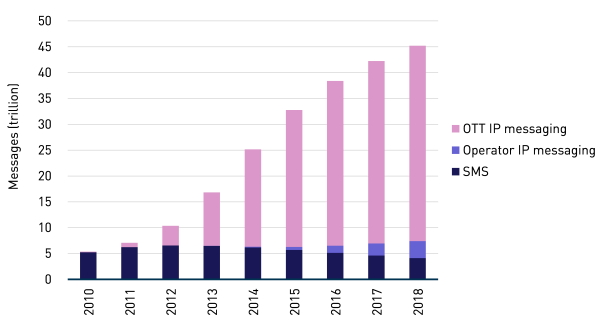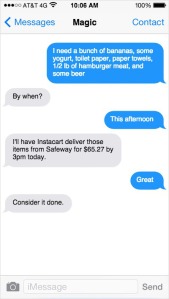A bit of statistics
The overall traffic in messaging apps is expected to more than triple by 2019 since 2014 – from almost 31 trillion to 100 trillion globally, according to Juniper Research. Messengers are the technology that facilitates both entertaining activities and business collaboration. Over the top communication is quick, easy and cheap and it will connect people in so many new ways during the upcoming years. Today we will speak about the features that enrich messengers in order to give you more than just an opportunity to send a «Hello, where are you?» message.
Why it’s good for people
The start of 2016 has proved that the global audience has shifted to messengers. According to the Business Insider report, the combined user base of the top four chat apps is larger than the combined user base of the top four social networks. This popularity is predictable: it’s cheaper than traditional telecommunications, it has more features than e-mail and it’s more private than social media. On top of that, the cost of plain smartphones has become relatively low, and the interface of messengers is easy even for your grandmother.
An average smartphone user has ~36 apps installed with 68% of them in the field of social & communication. The services that are the most popular in different countries vary, however most users use several messengers to connect with family, friends and co-workers.

Why it works for business
Earlier business learned how to use social media to connect with users, now they are starting to benefit from messengers, that are used both for external and internal communications. Messengers offer more features for communication and teamwork than e-mail combined with traditional mobile phone phones could ever offer. The number of e-mails that people need to send daily has reduced, as all urgent issues are discussed immediately in messengers. According to a recent study by Symantec Corporation, 55% of those who use instant messaging at work claim that it cuts down on email traffic and 50% find it’s a more efficient way of communicating than email.
E-mail still has strong positions, it may be a little old-fashioned, but it’s universal, and people don’t need to use the same mailing service to contact each other. However, messengers have more to offer for business than just communication; some of them, including VIPole, provide enterprise solutions with the opportunity to manage the members of the system, their settings and connections. When 67% of people are using text messaging for business communications, companies that want to ensure the safety of their data prefer to introduce their own, centrally controlled communication system to unite the employees.
How messengers won the mobile communication market
Communication in messengers is asynchronous, and you always have time to invent a witty answer and to consult Google. Messengers allow you to keep in touch with those people who are your frequent company, as you always see the recent dialogues that include the full history. The topics in dialogues change constantly like in real life, and when you contact someone, you can instantly reach not only your messages, but also the pics and files that you have ever sent to each other.
Pure instant messaging can hardly impress anyone nowadays, that’s why messengers suggest other opportunities for their users: some have bots and public channels, some have open discussion boards for professionals, some have multiuser conferencing and some even allow purchases within the messenger. We’ll give all these development opportunities a closer look to choose those that are likely to win the market.
Bots
Bots are useful for many areas of life, personal and business. Companies can automate the delivery of its services and consult their clients via bots. With the growth of the Internet of Things and the development of bot technology, your fridge is likely to soon notify you when it lacks milk. Bots talk to you within the messenger that you are used to, no need to download a special app.
Some messengers, including WeChat, Kik, Line, Facebook, Slack, Telegram, offer the opportunity to create bots. With bots, users can get informed about currency exchange rates and weather, about the time when the bus is likely to arrive, get links to e-books, play games, subscribe to National Geographic photos, search for images, find local bars, get foreign language tips – in fact, all these kinds of data are available through search engines and social networks. The content remains the same, what is different is the way of obtaining information. Buying tickets to the cinema or museum and ordering a taxi to get there will no longer require additional apps – your messenger will do the job if you know how to ask.
Messengers are already proving that they can be used not only for keeping in touch with friends and relatives, but also for connecting with brands, public services and government. Some services have started to provide their user interface through messaging, like Siri, Facebook’s M, Luka, Magic or Operator. Users communicate with bots in the habitual way and don’t need to get used to the new interface.
Purchases, transactions and orders
 Messengers have the potential of assisting users in almost all online affairs. In some countries, they are already driving out special apps for various services, says Julie Ask, principal analyst at Forrester. In China, WeChat is used to order food, order a taxi, purchase airline tickets, check bank balance and even play games. The Japanese messenger Line allows users to make purchases at stores. For users this experience is just like texting a friend.
Messengers have the potential of assisting users in almost all online affairs. In some countries, they are already driving out special apps for various services, says Julie Ask, principal analyst at Forrester. In China, WeChat is used to order food, order a taxi, purchase airline tickets, check bank balance and even play games. The Japanese messenger Line allows users to make purchases at stores. For users this experience is just like texting a friend.
Snapchat, Line and Facebook allow users to send money to each other within the app, however, the security of these transactions is doubtful. Phishers may send messages notifying that a user has received money from a friend and only needs to provide some personal information to get it. In addition, one more question lingers, as Facebook knows, what people like, where they study and work and who are their friends. Now the company is going to collect information about what people are buying, thus the advertisers will get a huge database of potential customers.
Compatibility

People prefer universal instruments even when they use just a few functions. It’s like the smartphones that are acquiring more and more functions apart from communications. You may even install a flashlight app on your smartphone. Messengers also strive to offer as many features as possible; users become more demanding and tend to use several services for instant messaging and OTT calls.
Integration and compatibility is what made email a universal way to connect with anyone who had a mailbox on any server and SMS – a technology that united people regardless of their mobile operator. Users do not need to download the same app and authorize each other to connect. This is why we all used to love SMS – before messengers. The total volume of messages sent from mobile devices via IP services exceeded the volume of SMS messages in 2013, at more than 10.3 trillion compared with 6.5 trillion worldwide. These trends are continuing, driven by increased adoption levels, because messengers are cheap, easy, feature-rich and of course fun.
A messenger that would allow sending a message to any other messenger, to any social network, to any e-mail and even sending an SMS might become handy. However, the services that allowed connecting to all social media failed to become as popular as independent social media. Probably the reason lies in the habit of diversifying communications. There’s one tone for sharing life experience with friends and the other tone for discussing business.
Entertainment and media
Public channels of celebrities, sets of stickers and plain games are fun, but clearly they are not the future. Of course, you can use the most powerful and versatile iPhone to lay solitaire and many do, but if you are reading this, you probably wish to get the most of technologies. Otherwise, we would recommend Nokia 3310 for everything. Still public channels can be useful for public figures and media that use all possible resources to spread the word about themselves.
A number of messengers, including Slack and Viber, offer public channels that unite people who share the same interests: cooking, sports, TV shows. While in Viber public chats are mostly entertaining, Slack is business-oriented. The content is almost the same that is accumulated in social media, blogs and other online communities. Traditional media create open channels in messengers as well, which is quite useful during breaking news, but may seem disturbing on other days.

Not just hobbies and business interests unite people, location also does – and in the times when there was no Internet the local community was our chat room. Then communities took advantage of chats, blogs and social media. Now people who live in the same area use group chats in messengers to discuss, where to buy organic food, where to hire a nanny and post photos of missing cats. Local communities will probably revive in messengers – until a better uniting technology emerges.
The new era of business collaboration

Instant messaging fosters the collaborative culture in organizations; however, the services that are in use today may still lack functionality for many tasks. Slack is handy for discussing ideas and integration with other services, but you can’t call someone, you can only write and wait until others write back. Line lets you talk with up to 200 people – but the conversation is not complemented with collaboration.
Here in VIPole, we solve all these problems and offer a universal tool for business. VIPole users can simultaneously participate in conversations in chat rooms and in conferences. Our voice and video conferences unite up to 256 people. Communication features work best with collaboration tools, including organizer, task manager and file manager. We believe that the future of messaging lies in the integration of all types of connections in one app.
Messengers are great not only for inner business collaboration, but also for ties with customers. Many businesses have started to provide support via several popular messengers. Specialized solutions, including Sonar and Ongair, allow to stay in touch with customers in several messengers simultaneously. When companies choose VIPole to connect with customers, they may support them both in chats and during audio and video calls.
Encryption and privacy protection
Compelling precedents with data breaches, large-scale leaks and Apple’s conflict with the FBI over access to iPhone data significantly influence the development of instant messaging industry. People have realized the value of their data and personal life, so now messengers win the loyalty of customers with not only features and entertainment, but with security. WhatsApp has eventually realized the importance of protecting customers’ data and started to encrypt conversations. At the same time, VIPole was initially designed in a way to protect our users’ data end-to-end since the moment of registration. We encrypt not just personal chats, but conferencing and passwords as well. Apart from protecting your data, VIPole saves you from undesirable contacts and lets you decide, whom to grant the opportunity of talking to you. Encrypted instant messengers has long been the choice of geeks and paranoids, but now, with the loud media buzz about privacy, the users who care about their safety are starting to realize the value of secure IM.
Another way of protecting communications is auto deleting messages. On one hand, you won’t be able to recollect what you discussed earlier. On the other hand – no one else will ever be able to get access to your conversations. Pew Research Center found that 17 percent of users have messaging apps that automatically delete sent messages. In VIPole, you can set the auto delete option for all contacts or for certain chats and choose the period after which we will delete your messages permanently.
Some final predictions

In future messengers will be even more diversified depending on the objectives and the target audience: while some services will add more entertainment features like stickers and games, the others will provide special solutions for enterprises, including conferencing and project management tools. Business messengers will be safe, handy and as indispensable as e-mail became once. Messengers have formed new communicational preferences: people prefer to text each other, not to call each other.
While social media represent who you are from the point of photos you post, places you visit and preferences you express, messengers represent what you think. The pure universe of ideas embodied in short texts. VIPole added collaboration features to this universe to make it work for business.
However, even messengers will be followed by something else. Communications change constantly, as well as the habits of people. What is certain is the fact that messengers will form the basis of communication in the near future.



